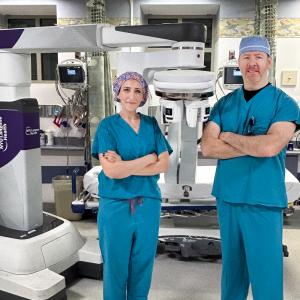
Photo: KATERYNA KON/SCIENCE PHOTO LIBRARY/Getty
Treating prostate cancer with focal therapy, a minimally invasive procedure that targets the cancer within the gland while sparing the healthy adjacent tissue, works best for people with prostate cancer who have a normal-sized prostate. For those with an enlarged prostate and localized prostate cancer, Herbert Lepor, MD, a urologic oncologist and chief of urology at NYU Langone Health’s Perlmutter Cancer Center, has launched a study of aquablation therapy, a procedure that has been used to successfully treat enlarged prostate, also known as benign prostatic hyperplasia. An enlarged prostate is one cause of male urinary dysfunction.
Focal therapy, also known as minimally invasive ablation treatment, typically uses energy sources such as high-intensity focused ultrasound, radio frequency, or laser energy to increase the temperature of prostate cancer cells. Urologists also have used cryotherapy to freeze and kill prostate cancer cells. Aquablation therapy uses high-velocity water jets, which are guided by transrectal ultrasound imaging for real-time visualization of the prostate and which deliver heat-free robotic therapy.
“Cryotherapy has been the workhorse of focal therapy for prostate cancer by urologists at Perlmutter Cancer Center, with extremely good outcomes for patients,” said Dr. Lepor, who is the Martin Spatz Chair of and professor in the Department of Urology and professor in the Department of Biochemistry and Molecular Pharmacology at NYU Grossman School of Medicine. “However, sexual dysfunction remains a potential side effect of cryotherapy. We think with aquablation we might be able to define the ablative field more precisely than we do with cryotherapy and avoid delivering energy outside of the prostate, which might account for some of the sexual dysfunction seen in cryotherapy.”
Perlmutter Cancer Center is one of three sites in the United States offering the aquablation study. Aquablation has been used at the Smilow Comprehensive Prostate Cancer Center by Christopher E. Kelly, MD, an assistant professor in the Department of Urology at NYU Langone, to treat benign prostatic hyperplasia since 2021.
“Perlmutter Cancer Center is one of the premier cancer centers in the country for focal therapy in terms of patient selection, treatment, and follow-up,” Dr. Lepor said. “When you combine that with Dr. Kelly’s tremendous experience with aquablation technology, we are extraordinarily well positioned to use this technology to treat prostate cancer.”

